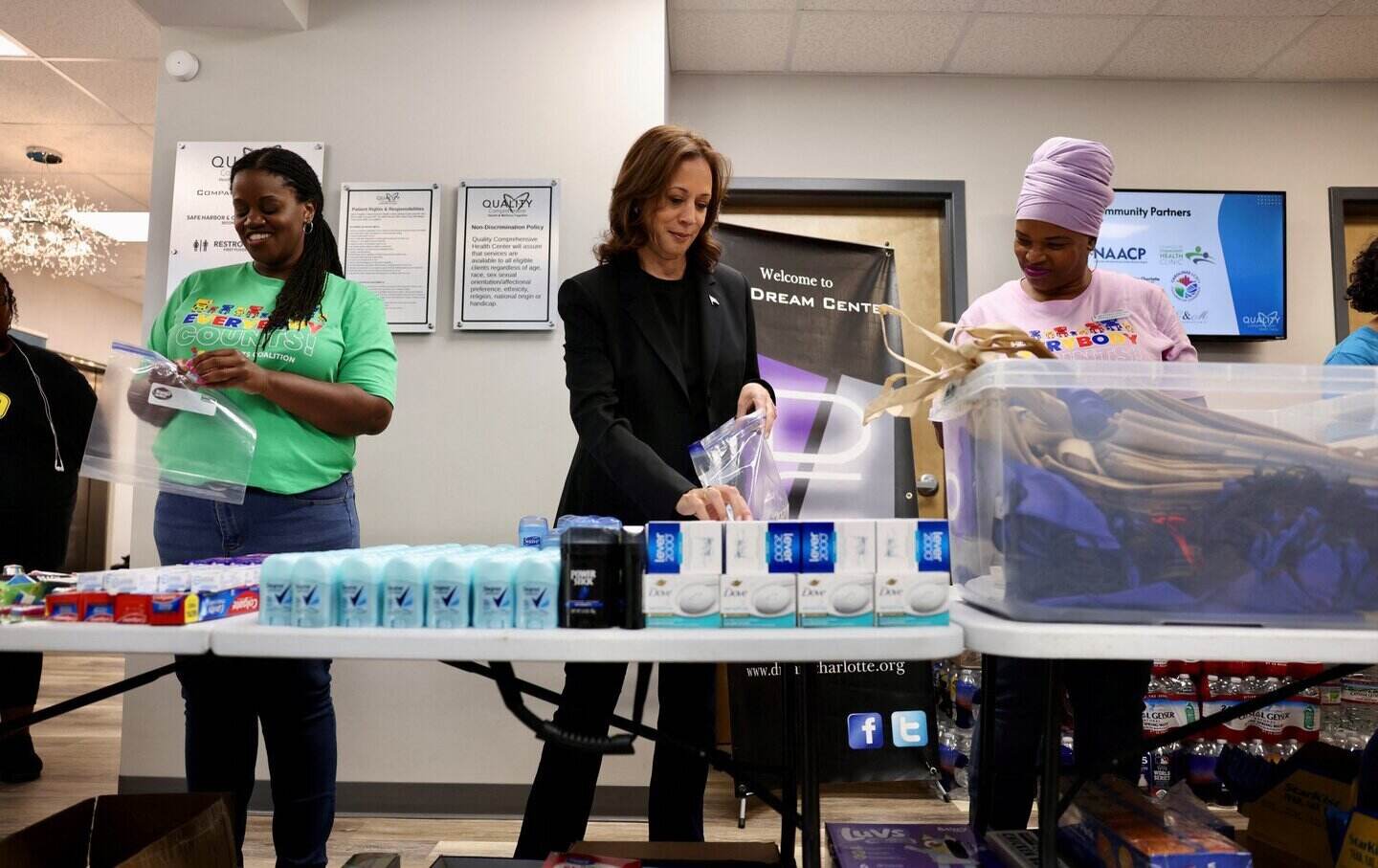Why Democrats Can’t Write Off the Rural Vote
On this episode of See How They Run, Jane Kleeb, Anthony Flaccavento, and Sarah Taber on how the party can win in small-town America.

Here's where to find podcasts from The Nation. Political talk without the boring parts, featuring the writers, activists and artists who shape the news, from a progressive perspective.
A lot of people who voted for abortion rights referenda this year also voted for Trump. What were they thinking? How do they understand politics? Amy Littlefield spent election day in Amarillo, Texas, trying to find out.
Also: John Lewis, who died in 2020, challenged injustice from the sit-ins of 1960 to the Age of Trump. Historian David Greenberg talks about what we can learn from his example. Greenberg’s new book is “John Lewis: A Life.”
Advertising Inquiries: https://redcircle.com/brands
Privacy & Opt-Out: https://redcircle.com/privacy

US Vice President Kamala Harris helps prepare hygiene related care packages at a health clinic where the N.C. Counts Coalition non-profit is preparing then delivering them to victims of Hurrricane Helene in Charlotte, North Carolina, on October 5, 2024.
(Logan Cyrus / AFP)Few questions have bedeviled Democrats as much as the question of how—or even whether—to reverse their decline in rural and blue-collar America. Long gone are the days when the party was seen as the natural home of the working class. Now, the dominant narrative goes, Democrats are a haven for urban, highly educated elites, while the Trump-led GOP makes inroads among working-class voters of all races, thus imperiling the coalition that has sustained Democrats for decades.
With states like Pennsylvania, Wisconsin, and Michigan on a knife-edge this November, the Democrats need every vote they can get. So on today’s episode, we’re kicking the tires on the party’s relationship to rural voters. We have three guests who live and breathe rural America—and who are adamant that, far from being a lost cause for Democrats, many rural and working-class voters could be up for grabs if the party made a serious effort to win them over.
Jane Kleeb is the chair of the Nebraska Democratic Party and the author of Harvest the Vote: How Democrats Can Win Again in Rural America. Anthony Flaccavento is an organic farmer, co-chair of the Rural Urban Bridge initiative, and the co-author of The Nation’s Rethinking Rural column.
And, in a special bonus segment, we spoke to Sarah Taber, the Democratic candidate for North Carolina Commissioner of Agriculture, about her campaign and how she is trying to bring urban and rural residents in her state together.

Here's where to find podcasts from The Nation. Political talk without the boring parts, featuring the writers, activists and artists who shape the news, from a progressive perspective.
On this final episode of The Nation's election coverage podcast, See How They Run, D.D. Guttenplan is joined by John Nichols and Jeet Heer to discuss lessons learned from the 2024 Presidential races.
Advertising Inquiries: https://redcircle.com/brands
Privacy & Opt-Out: https://redcircle.com/privacy
Subscribe to The Nation to Support all of our podcasts
We cannot back down
We now confront a second Trump presidency.
There’s not a moment to lose. We must harness our fears, our grief, and yes, our anger, to resist the dangerous policies Donald Trump will unleash on our country. We rededicate ourselves to our role as journalists and writers of principle and conscience.
Today, we also steel ourselves for the fight ahead. It will demand a fearless spirit, an informed mind, wise analysis, and humane resistance. We face the enactment of Project 2025, a far-right supreme court, political authoritarianism, increasing inequality and record homelessness, a looming climate crisis, and conflicts abroad. The Nation will expose and propose, nurture investigative reporting, and stand together as a community to keep hope and possibility alive. The Nation’s work will continue—as it has in good and not-so-good times—to develop alternative ideas and visions, to deepen our mission of truth-telling and deep reporting, and to further solidarity in a nation divided.
Armed with a remarkable 160 years of bold, independent journalism, our mandate today remains the same as when abolitionists first founded The Nation—to uphold the principles of democracy and freedom, serve as a beacon through the darkest days of resistance, and to envision and struggle for a brighter future.
The day is dark, the forces arrayed are tenacious, but as the late Nation editorial board member Toni Morrison wrote “No! This is precisely the time when artists go to work. There is no time for despair, no place for self-pity, no need for silence, no room for fear. We speak, we write, we do language. That is how civilizations heal.”
I urge you to stand with The Nation and donate today.
Onwards,
Katrina vanden Heuvel
Editorial Director and Publisher, The Nation
